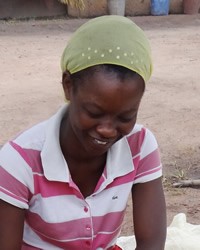The Kulango originated in the northeastern part of Cote d'Ivoire near Bouna. They eventually occupied Bondoukou (south of Bouna) as well. Some have since moved across the border from Bondoukou into the central western regions of Ghana. The Kulango in Cote d'Ivoire are called Bouna Kulango and also as Bondoukou Kulango. The Kulango speak Kulango Bouna (or Nkurange), a Gur language from the Niger-Congo language family.
The Kulango are closely related to the Lobi, their former enemies. The two groups occupy the same region and share similar languages, customs, religious beliefs and lifestyles.
The Kulango are primarily farmers, growing yams, maize, beans, peanuts, okra, peppers, cotton, bananas, papayas and watermelons. Some of the farmers also breed goats, sheep, and cattle. The women gather wild fruits and nuts, while the men do most of the agricultural work. The women also tend to small vegetable gardens at home.
The Kulango live in a very hot region with only one annual rainy season. That land was once fertile, but now it is dry. For that reason, many of the Kulango and neighboring groups are moving south to find a place with adequate rain. When a man finds a plot he wishes to farm, he settles the land until he earns enough money to build a home for his family. Only then does his family join him.
Each Kulango village is made up of several small settlements. The settlements consist of a number of mud huts with cone-shaped roofs made of palm leaves or thatch. The huts are grouped around a center court, which serves as a meeting place. Every settlement is made up of several extended families, each of which is its own economic unit.
While most of the Kulango continue living as farmers, many of the young people have migrated southward in search of work in the cities where they have found wage-paying jobs as taxi drivers, mechanics or office clerks.
The male head of each extended family is responsible for offering sacrifices to the ancestral spirits. He is succeeded by his oldest sister's eldest son. All disputes and community affairs are handled by the village headmen and the religious chief.
Most Kulango girls are betrothed while they are young. Marriages are arranged by either the girl's father or the extended family head. When a man marries, his bride may either join him or remain in her father's home. If she remains with her father, her daughters live with her, and her sons join their father when they are able to walk and talk.
The Kulango celebrate many festivals, such as the annual yam festival. There is also a festival for the dead, in which they ask the gods and ancestors for guidance and good crops. There is dancing and music during both festivals.
About one in four Kulango people in Ghana identifies as Christian, but Christian or not, the majority continue to practice traditional ethnic religions. They believe in a supreme god who is not worshipped but is associated with mother earth. The earth god, Tano, is a god of the whole tribe. There is a shrine set up for Tano, and a yearly festival is held in his honor. During disasters or hard times, the Kulango pray to the spirits of their ancestors and make offerings of mashed yams. They believe spirits inhabit certain wild animals as well as various objects of nature such as thunder, lightning and water.
Though some of the Kulango have accepted Christ, most of the others have not yet heard a clear presentation of the gospel. Bible resources and other evangelistic tools are needed to see these people reached for Christ.
Ask God to raise prayer teams who will begin breaking up the spiritual soil of Ghana through worship and intercession.
Ask God to save Kulango leaders who will boldly declare the gospel in their villages.
Pray that the Lord will strengthen and encourage the Kulango who have given their lives to Christ.
Pray that strong multiplying churches will be planted among the Kulango.
Scripture Prayers for the Kulango, Bouna in Ghana.
https://www.101lasttribes.com/tribes/kulango.html
https://www.zyama.com/kulango/
| Profile Source: Joshua Project |












